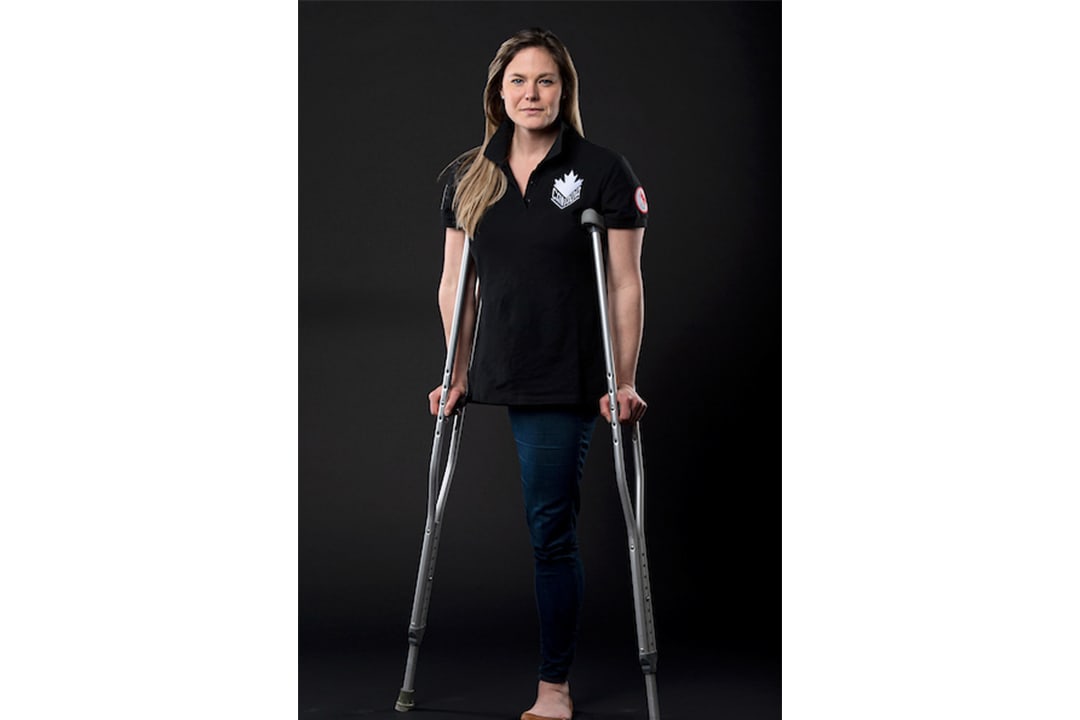At the 2000 Paralympic Games in Sydney, Australia, 16-year-old swimmer Stephanie Dixon won five gold medals — the Canadian record for most golds at a single game.
Dixon views that competition as a standout memory from her long and illustrious swimming career. Yet it wasn’t just the medals that stood out — it was also the environment around the pool. “We had 17,000 people in the stands there to watch us swim. I was used to having some parents clapping for us in the stands,” Dixon reminisced in an interview with The Varsity.
In November 2023, Dixon earned another big achievement in her life, in a very different environment: she finished and collected her master’s degree from the Faculty of Kinesiology & Physical Education (KPE) at U of T.
Coming back to school wasn’t just about getting a degree: “I didn’t care as much about having a designation of a master’s in science,” Dixon said. That isn’t hard to believe when her resumé also includes 19 Paralympic medals, six gold medals from the Parapan American Games, 10 gold medals at the IPC World Championships, and membership into Canada’s Sports Hall of Fame and the Order of Canada.
“I think [my degree] was really about personal transformation,” Dixon added. “I wanted to learn more about my disabled identity and my experience of harm and marginalization in sports… and how we can [also] begin to contribute towards dismantling systems of oppression and harm.”
Challenges and accomplishments
Early on in her swimming career, Dixon — who was born without her right leg and hip, and with an abdominal medical condition known as omphalocele — struggled with her identity and experience as a disabled person. While it’s a label she now wears proudly, she didn’t always like to be labelled as disabled. “I was just trying to fit in and not stand out,” Dixon explained. “I wanted to be viewed as very capable and very able, and just as good as my non-disabled teammates.”
Dixon’s parents encouraged her to explore the passion she had for the water, enrolling her in swimming lessons when she was around two years old. “[My coaches] helped me to be comfortable in my different body on the pool deck, as well as to challenge me in many different ways,” she added. The coaches she had were the ones who helped her explore the parasport and mainstream sports world, but viewing other disabled athletes also helped her recognize that she could be disabled and a ‘real athlete’ at the same time.
Over time, one competition led to another, and Dixon began progressing further into the world of competitive swimming. Dixon retired from competitive swimming in 2010 and moved to Whitehorse, Yukon, exploring other sports and beginning a new chapter in her life as a coach.
Ableism in parasports
When she was around 37, Dixon realized that sports was not always a place of joy, belonging, and inclusion. “I started to see that there was a lot of ableism [and] there was a lot of harm,” Dixon explained. Awareness of parasports and para-athletes has increased immensely — yet Dixon’s thinking towards parasports has also evolved.
“I used to think that it was so powerful to show the world what disabled people could do,” she said. “[But then I] started to question why we feel the need to show as disabled people how ‘able’ we are all the time, and how much [of] that is a reflection of our internalized ableism.”
“Ableism makes us think that disabled folks are less than or inferior to non-disabled people,” Dixon explained further. “While I love my swimming career, I think it offered me an avenue to try and prove that I was not ‘less than,’ that I was not inferior, and that I was not disabled.”
“I don’t think there’s anything wrong with a disabled athlete wanting to challenge [themselves]… and see what [they’re] able to do,” Dixon added. “[Yet] disabled people shouldn’t have to be ‘able’ or ‘athletes’ to be considered valuable.”
So Dixon decided to return to school to explore how sports can become a more safe and inclusive space. She was directed to Dr. Gretchen Kerr, the Dean of KPE at U of T, and Dixon discovered that they had similar values and visions. “It was an easy decision after that to apply to the University of Toronto,” she said. Dixon credits Kerr and KPE Professor Emeritus Bruce Kidd for supporting her throughout her degree.
Community and belonging
U of T was also a familiar place for Dixon — during her last two years of high school, Dixon swam with the U of T swim team. When she moved back to Toronto for her in-person classes, Dixon began swimming at the Varsity Pool again and reconnected with some old teammates. “It was incredibly meaningful to kind of come full circle, 20 years later,” Dixon said.
While it feels good to witness your skills improve, in the end, sports are about exploring what our bodies and minds are capable of and supporting each other as we learn and express ourselves, Dixon explained. “Sports and recreation [should] bring us joy and feelings of community and belonging.”
On the academic side, Dixon encourages students to take the time to let their research and experiences change them, to “let the knowledge and different ways knowing and being have a chance to integrate.” She encourages others to do the same: study in order to go on a personal journey that can change you and your ways of thinking.



No comments to display.